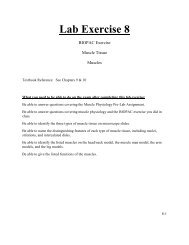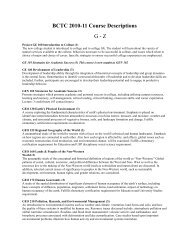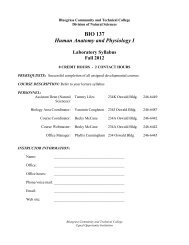THE NATURE, UNITY AND VALUE OF GEOGRAPHY
THE NATURE, UNITY AND VALUE OF GEOGRAPHY
THE NATURE, UNITY AND VALUE OF GEOGRAPHY
Create successful ePaper yourself
Turn your PDF publications into a flip-book with our unique Google optimized e-Paper software.
2 <strong>THE</strong> PR<strong>OF</strong>ESSIONAL GEOGRAPHER<br />
strength, but to scholars and administrators from other disciplines this czpacity may<br />
be viewed as eclectic, even parasitic, and as evidence of the lack of disciplinary<br />
focus. In an era of declining university enrollment and support of higher education<br />
and of the termination of “weak or non-central” programs, we cannot afford either<br />
to rely on the good will of competitors to recognize our good works or to carry on as<br />
usual as “undisciplined” discipline.<br />
The loss or threatened loss of geography programs or of their separate identity is<br />
not unique to our discipline, yet it serves as an obvious warning to even the<br />
strongest programs that all is not well. Geography has some real problems, but it is<br />
also making a greater contribution than ever before, and is well deserving of our best<br />
efforts to preserve and enhance this role.<br />
We would not be geographers if we did not believe in the reality and value of the<br />
discipline. But it would be foolish not to recognize that not all the outside world<br />
shares our perception. The image or understanding of modern geography is<br />
clouded, even among academics in closely-related fields. We have done little to<br />
dispel this nebulous image.<br />
in Canada and Europe, geography has a strong and popular base in the primary<br />
and secondary educational system, but in the United States, formal geography is a<br />
fragile edifice at the college-university level, without substantial roots of public<br />
awareness and support. And while our students have been remarkably successful at<br />
finding and excelling in a wide variety of jobs, beyond academia, they are too rarely<br />
identified as geographers. We must, then, make clear to the outside world just what<br />
is the nature and value of geography, why geography is essential and central to the<br />
mission of education at all levels, and why the profession or occupation of geog-<br />
raphers should become increasingly recognized.<br />
Criticisms of Geography<br />
Attacks on geography are leveled both at specific problems of particular depart-<br />
ments (lower enrollment or faculty productivity) and at the profession as a whole.<br />
While a local termination or merger may have been decided on grounds of quality,<br />
isn’t the more important reason the judgment by some administrators that geogra-<br />
phy just didn’t matter, and we weren’t strong enough to do anything about it? Here<br />
are some common complaints lodged against geography:<br />
First, that it is not central, that is, it provides no essential dimension of higher<br />
education. While geography may be viewed as interesting, it is not often perceived<br />
as essential to either liberal education or to the training of other professions.<br />
Second, that it is parasitic and eclectic; that it has no core but is a loose collection<br />
of specialties which are more logically components of many more established disci-<br />
plines. This is a serious charge which we had better be prepared to deal with. This<br />
charge is based on various kinds of evidence, for example, the seemingly incredible<br />
heterogeneity of papers at our annual meetings. The image is hardly dispelled by the<br />
curricula at some institutions where there is a geography of almost everything-like<br />
economic, social and political. The problem really becomes serious when it comes to<br />
jurisdictional disputes over courses and degrees with planning, atmospheric sci-<br />
ences, sociology or engineering. I am very much afraid that too few departments<br />
have a core course or sequence of courses which provide a strong conceptual and<br />
theoretical basis for the diversity of topical and regional courses. If we do not, how<br />
can we counter the argument that we are doing sociology, or economics or whatever<br />
under another name? Can geography really be what geographers feel like doing? The<br />
problem is not diversity as such, since other disciplines, like anthropology, have<br />
many topical and areal specializations, but there is a recognition that these all stem<br />
from common theoretical concerns.
















